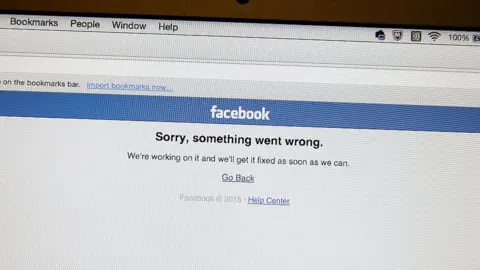The next stage of the tech backlash: tax
 Getty Images
Getty ImagesFor years, privately whispered among senior executives, the global digital giants that bestride the world knew they had a problem.
It was two-fold.
The first was data - will the public, on whose data we rely to make our billions of pounds of profit, continue to trust that we will use that data responsibly?
And if that trust starts eroding how will the authorities, the governments and the regulators, respond?
The second was tax - or more broadly the contribution these digital giants like Facebook and Google make to the countries in which they operate.
This week, long predicted by many of those executives whom I have spoken to over the years, the two issues have come together in a most toxic mix.
It is particularly toxic for those giants which have long appeared to many to be changing the way we live while writing their own, rather flimsy, rule book.
On data, Facebook specifically is under pressure.
But at Google or Amazon or any business that gains immense value from collecting and then slicing and dicing customer information, the possible damage from the mis-handling of that data is well understood.
When your very business model is reshaping the world - the way we communicate, the information we see - then the threat of calamity is never far away.
The techlash
Today, tax becomes the second prong of the techlash - the backlash against the folksy brand image of the digital giants, the "hey guys, just trying to do our best" meme.
The European Commission has today announced what would amount to the most significant change in business taxation for decades.
Its target is the likes of Facebook and Google and their "activity" in member states.
It is proposing taxing the revenues of those firms, country by country, dependent on the numbers of users and advertising income received.
It wants all member states, including the UK which has made similar proposals, to apply the new Digital Services Tax which would raise up to £6.5bn across the EU.
Given Britain has one of the highest levels of digital business use in the EU, a significant chunk of that money would come to the UK exchequer.
This is a fundamental change to the present tax rules which focus on the profits of companies which, for tax purposes, are closely aligned to where the company is headquartered and where its products are invented and built.
For companies such as Facebook and Google that is the US and that is where, quite correctly given the present tax rules, they pay the vast bulk of their taxes.
 Getty Images
Getty ImagesThat leaves a problem. The effective tax rates of digital businesses headquartered outside the EU is 9.5%.
The effective tax rate of traditional businesses operating in the EU is 23.2%.
Not fair, the EU says. And polls of public opinion suggest voters agree.
Europe v US
The EC's new directive is likely to spark irritation in the US which fears "double taxation" of its home-grown success stories.
But in Europe, good relations with America are playing second fiddle to the political need to act.
Governments and regulators are finally trying to get ahead of the tech giants.
Those giants have long known that the risks were there, those senior figures who worried about such things in private.
In response they have tried incremental change where the very dominance of their model (a dominance they have strived for) demanded, according to their critics, something much bolder.
Of course, it is not for the tech companies to write their own tax laws or data protection rules.
The EU and the UK government are taking on that battle, joining the two issues together.
Making it all a question of trust.
And leaving the tech companies on the back foot in a debate which they were having privately and has now become toxically public.
